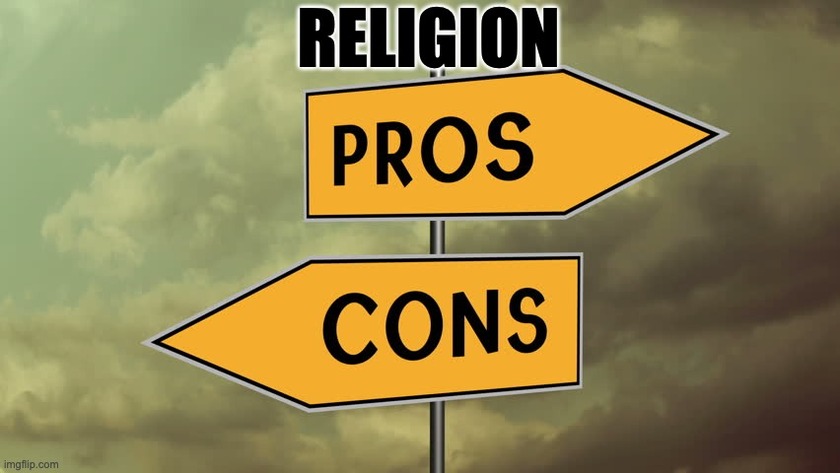
The Pros and Cons of Religion
By: Shmuel ben Shlomi
Religion has its pros and cons. Its supporters and detractors. I have put before you in this article a list of both; what others have declared concerning it and my own encapsulation of religion.
Religion has been equated as different things to different people depending on the era and philosophy of those interested enough to look into it. I have endeavored for years to find some positive quotes from famous scholars and leaders in the present and past. I have found few to none that address religion itself while most were quotes about the beauty and inspiration received by trust in G-d or gods. I have not listed them here since they address a belief in a supreme Being and not the religious apparatus that may have sprung from that belief in an Almighty Creator, or Source of all that is.
I will use one of my own quotes as it pertains to religion. All religions that have ever come into existence are the creation of human beings and not a god or a Supreme Being. They are humankind’s attempt at explaining the Unexplainable, to know the Unknowable and peer into the Unseeable.
Some of the strongest opponents against religion have defined it as follows:
"Religion is comparable to a childhood neurosis.” - Sigmund Freud
"Religion is the opium of the people. It is the sigh of the oppressed creature, the heart of a heartless world, and the soul of our soulless conditions.” - Karl Marx
“Religion is stabilized superstition…” Spinoza
Friedrich Nietzsche grew up in Germany in the 19th Century and as a youth was quite religious with a stern Lutheran upbringing having been raised by a father who was a Lutheran minister. His father sent him to the University of Bonn where he studied Christian theology with the intent of following in the footsteps of his father. However, his religious studies eventually made him aware of the philosophy of Arthur Schopenhauer which led the young genius to become an avowed atheist who came to view all religions, particularly Christianity, as nothing more that a crutch or “shield” that humankind has dressed themselves with to soothe its sometime lack of morality.
Speaking of Schopenhauer his view on religion was metaphorical. “Religion is the masterpiece of the art of animal training, for it trains people as to how they shall think.”
All the above paint a pretty sad picture of religion so let’s take a look at a more modern definition of religion to see if any redemption can be found.
Merriam-Webster defines religion as: “A cause, principle, or system of beliefs held to with ardor and faith.”
That’s pretty innocuous sounding and adequately defines its basic meaning as understood by most people.
So then, if the basic meaning of the word and idea of religion is kind of banal, why have some of the greatest minds in human history viewed it so negatively?
That is a very complicated question but with just a little research the truth of those negative concepts presented by all the above can be easily understood.
In order to understand the concept of religion it is important to get a handle on the various religious influences that have made an impact on the lives, cultures, politics and structures of societies and civilizations over the long term. Starting from the oldest to the newest those that still remain making an indelible mark on us all are as follows: (included will be the name of the human being responsible for its creation). I will be using the scholastic dating of BCE - Before Common Era and CE - Common Era.
Anism - circa 10000 - 4000 BCE - no one established creator
Hinduism - circa 4000 BCE no one established creator
Judaism - circa 1300 to 1400 BCE established by Moses (4000 BCE if you start with Avraham)
Buddhism - circa 500 BCE founder was Gautama Buddha
Christianity - circa 40 to 60 CE established by the Apostle Paul
Islam - circa 570 to 632 CE founded by the Prophet Muhammad
Sikhism - circa 1460 to 1539 CE created by Guru Nanak
Mormonism - circa 1840 CE created by Joseph Smith and perpetuated by Brigham Young
Jehovah Witness - circa 1872 CE founded by Joseph F. Rutherford
While these are the largest continuing religions in our time (the 21st Century CE) there have been many others over the millennia that greatly effected and helped form past civilizations such as the following:
Anism - the worship of Anu, EN-LIL, EN-KI and a pantheon of gods the earliest known civilization in Sumer (located in Mesopotamia in the Middle East). Sumer was the first great post-Deluge civilization that brought the world agriculture, engineering, mathematics, astronomy, the wheel, politics and domestication of animals. The followers of this first established religion attributed their understanding of all these things to a a gift from a group of extraterrestrials they called the Annunaki (called Anakim in the Hebrew Bible). This was the predominate religion circa 10,000 to 4,000 BCE. It continued through the period of Akkadian and Babylonian Empires.
Hellenism - the Greek contribution to religion centered on traditions and rituals surrounding a pantheon of gods led by Zeus the head of all the gods. It sprang up basically as a continuation of Anism but giving those older gods new names and expanding on their tales and mythos circa 900 BCE to 4 CE with no known creator but many attribute it to Homer which is pure speculation.
Romanism - is the Roman adaptation of much older religious influences including Hellenism which preceded it, as well as Etruscan and other lesser known religions of the period circa 700 BCE to 313 CE. The influence of Rome on modern day religion is mostly seen in Roman Catholicism, the largest existing Christian sect. It fully integrated Roman politics and structure when the Roman Emperor Constantine declared Christianity to be a tolerated religion of the Roman Empire circa 313 CE and cemented this with the Council of Nicea in 325 CE. However, it was under Emperor Theodosius Augustus that Christianity was declared to be the Roman Empire’s State and only acceptable religion circa 347 to 395 CE.
Other important but lesser known religious influences have been Zoroastrianism in Persia (modern day Iran) circa 1500 BCE and was the first religion to introduce the concept of monotheism (worship of one god). This was followed up with another monotheistic religion in Egypt called Atenism, the worship of one god in the form of the sun around 1353 BCE but was short-lived once its creator, Pharaoh Akhenaten died. Some believe that these two monotheistic views were the inspiration for Moses, who according to the Torah was raised and steeped in the Pharaoh’s court of his time to rebel against its religious system and ideology. He would have been familiar with both of these older traditions and may have adapted them as a means of freeing some of the citizens of Egypt from the despotic reign of the Pharaoh of his time.
A study of religion must lead us to ask why are any kind of religious system needed within human communities? What possible purpose could such systems serve? Why were they even necessary and why does it seem human beings are so prone to religious influence over their lives?
While those men I quoted at the beginning of this article were overtly against religious practice of any kind surly there must be some positive aspects to such practices or humans wouldn’t be so drawn to its lure. What is it about religion that makes humankind believe they are helpful and necessary? What are the admirable or favorable aspects of religion?
Down through the ages this question has been addressed and goes something like this:
Religion offers the individual and society a manual or guidepost on how to live their lives in cooperative harmony. It gives those who practice its tenets stability and purpose. It offers up limits on what society may deem unacceptable behavior (“knowing right from wrong”) as it is determined by that society. It can unify a civilization for a common purpose be it correcting a perceived social injustice or a good reason to go to war against those who do not hold to that society’s brand of religion. These type of arguments for religion hold to the idea that human beings are beyond the ability to govern themselves and need to be controlled by the laws and precepts of that civilization’s religious standard of behavior — humans would run-amuck without such guidance as their outer voice is so loud since their inner voice appears to be either nonexistent or has very little influence on behavior overall.
Are theses listed apologetics for religion true? Do they sound reasonable? That is up to the reader to decide.
Now let us look into the negative effects of religion on the individual and society as a whole.
Another great mind was Albert Einstein. He queried that, “If people are good only because they fear punishment, and hope for reward, then we are a sorry lot indeed.” I would have to agree with him.
I have studied and participated in various religious forms over my lifetime. Traveled across the globe to the Middle East, Far East, Indus Valley, Mexico and the Pacific Islands. I have studied and been a part of several religious traditions, including by birthright religion of Judaism. Christianity in its various forms were a part of my life for thirty years as was others. I have extensively studied the pages of the Torah, the Tanakh, the Christian Bible, the Hindu Vedic texts, Tibetan rituals and so forth. What I have found in them all, with perhaps one exception, is that the foundation for every one of these religious traditions is fear.
My own Judaic tradition is literally filled with it. The groundling of it and the others that have sprang from it is triple coated with a layer of fear that if one does not follow the statutes and commandments given to us through Moses then our G-d will strike us down with a plague, pestilence, exile, famine, and death.
History has also shown us that instead of unifying us it is the number one cause of division among us, the other great divider being politics. The past and present are ripe with examples of religion being at the forefront of wars, inquisitions, raping, pillaging and the destruction of those who fail to measure up to our particular brand of religious expression. More wars, death and destruction can be attributed to human beings blindly following their religious beliefs than to any other cause. Countless millions have died as a result of religion urging its followers to murder their fellow human because their god told them to.
It has been estimated that at least 195,035,000 people have perished as a result of religious wars, pograms, holocausts, terrorism over the last two thousand years. All in the name of some religious ideology and belief. This doesn’t count all the religiously imposed deaths between 10,000 BCE and 1 CE. These numbers are astronomical and is a sad epitaph for religion of any kind.
In the name of religion those who blindly follow their particular brand of it have gone into poverty at the insistence of a religious leader to sell all they have. Many have delayed important and needed medical procedures that would improve their condition and even save their lives because their religion forbids such medical treatment.
Ultimately, most religions encourage people to separate from those unlike them which fosters elitism, racism and bigotry which if left unchecked can create an attitude of superiority and allows for the justification of slavery over others not in their religious clan. This allows it's followers to feel contempt for their fellow human being instead of fostering love and tolerance.
Is religion a good thing? Or, is it a fool’s paradise? You will need to decide.
As for me and my house we view religion as more problematic and the cons far outweigh its pros.

Parshat Naso is the longest single parsha in the Torah, clocking in at 176 verses. That’s Torah’s way of saying, “Hey, you might want to take a long , serious and contemplative look at what you’re about to learn.”
Also on Substack: https://substack.com/home/post/p-165229596?source=queue
The 613 Commandments of Torah: Part 18 - the Blog
https://shmusviews.blogspot.com/2026/03/the-613-commandments-of-torah-part-18.html















